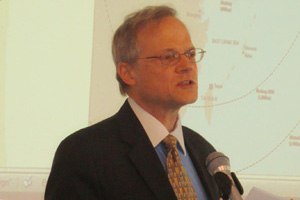

On March 19, 2012, the Vienna Center for Disarmament and Non-Proliferation (VCDNP) hosted a seminar by Mark Fitzpatrick, Director of the Non-Proliferation and Disarmament Programme, International Institute for Strategic Studies (IISS), London, and editor of the 2011 IISS strategic dossier "North Korean Security Challenges: A Net Assessment." The Embassy of the Republic of Korea sponsored the seminar in cooperation with the Permanent Mission of Japan in Vienna.
HE Mr. Cho Hyun, Ambassador of the Republic of Korea to Austria and Permanent Representative to the United Nations in Vienna offered welcoming remarks. Mr. Kim Sang-jin, Director of the Office of Korean Peninsula Peace and Security Affairs, Ministry of Foreign Affairs and Trade of the Republic of Korea, provided comments to Mr. Fitzpatrick's presentation. Executive Director of VCDNP Elena Sokova moderated the discussion.
In his presentation, Mr. Fitzpatrick provided an overview of the security challenges North Korea presents to its neighbors and to the nuclear and missile nonproliferation regimes. He remarked that only a week earlier his presentation would have described the situation in a more positive light following the February 29, 2012 agreement between the United States and North Korea. In this deal, Pyongyang agreed to a moratorium on nuclear tests, uranium enrichment and long-range missile launches, and to allow inspectors from the International Atomic Energy Agency back into the country after a three-year absence. Yet, the March 16 announcement by North Korea of its intention to conduct a satellite launch, which is widely seen as a violation of a number of UN Security Council resolutions, and against the letter and spirit of the US-DPRK deal, cast doubt on the future of the recent progress.
Mr. Fitzpatrick noted that while the opaqueness of the North Korean regime makes a definitive analysis of the recent decisions difficult, the country's security policy continues to be dominated by the principle "military first." Given the inconclusive results of prior missile and nuclear tests, the decision to proceed with another missile launch appears inevitable. Moreover, another nuclear test cannot be ruled out.

By continuing to use the site, you agree to the use of cookies. more information
The cookie settings on this website are set to "allow cookies" to give you the best browsing experience possible. If you continue to use this website without changing your cookie settings or you click "Accept" below then you are consenting to this.